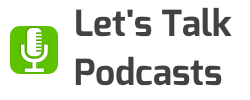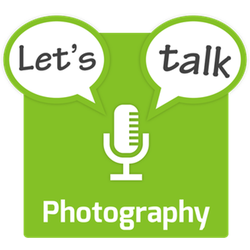Panel
- Bart Busschots (host) – @bbusschots – Flickr
In this solo show Bart takes the opportunity to step back and look at the big picture when it comes to AI and photography. It’s been a year and a half since the Dall-E explosion, so how has, and how hasn’t the world changed? What’s ahead of us?
While this podcast is free for you to enjoy, it’s not free for Bart to create. Please consider supporting the show by becoming a patron on Patreon.
Reminder – you can submit questions for future Q & A shows at http://lets-talk.ie/photoq
It’s been a year and a half since I first broached the topic of AI on this show with a two-part episode with Antonio Rosario, starting with me leading an explanation of what AI is (LTP 112), and Antonio’s leading a discussion on what it means for our beloved art and craft (LTP 113). That was followed two months later by an episode dedicated to the question of whether generative images even are photography, and whether they are art (LTP 115). That was triggered by an artist rejecting a photography prize for an image created with the help of generative AI. We next broached the topic when I changed my mind on the ethics of training AI (LTP 119). That was followed a few months later by an episode pointing out that while AI makes it more obvious, you never actually could assume photos were ‘true’ (LTP 121). Finally, early this year I dedicated an episode to a technological solution for verifying the source of an image (LTP 125).
So, on the one hand, I’ve clearly not been ignoring AI in the twenty odd months since ChatGPT and Dall-E exploded into our zeitgeist, but I’ve not taken the time to step back and zoom out to look at the big picture since that very first double episode.
With the two-year anniversary of the generative AI breakthrough rapidly approaching, and with Apple throwing their hat into the ring with their Apple AI announcement last month, now seems like a good time to take stock.
The Legalities
On the one hand, it’s not surprising things are moving very very slowly on this front, but I’m still surprised by how little has actually been decided. So far the question of whether or not training is copyright infringement seems closest to being settled, but that’s not actually saying very much. No copyright claim has been upheld, but there hasn’t been a major case in front of a Supreme Court either, so all those lower court rulings could easily be overturned.
Even if copyright is settled but we don’t know it yet, that leaves lots more training-related questions unanswered. For example, just this week the copyright parts of a big case against Microsoft & OpenAI were thrown out, but the case is proceeding on the basis of claims of breach of contract and breach of open source licenses (Judge dismisses majority of GitHub Copilot copyright claims — www.developer-tech.com/…).
Another utterly open question is who’s responsible if AI is used to do some kind of harm — the person who did the prompting and used the results maliciously? The AI provider? Both?
All of those are generic questions, so let's zooming in on photorealistic AI-generated imagery. We have no idea how to handle deep fakes, let alone images designed to imitate an artist’s work. Do we have a right to our likeness? Are AI generated imitations counterfeits?
Legislation
There’s absolutely no sign of any kind of AI legislation in the US, and while Europe has managed to legislate the low-hanging fruit with the AI act, it doesn’t answer any of the big questions on the legalities of training, deep fakes, or imitations.
I think we need legislation to create a right to our likenesses, so deep fakes can be prosecuted. But that won't be easy because it will need to be carefully balanced with free speech rights, especially for satire.
We also need some kind of right to our brand so imitations of our art really are treated the same as fake Levis.
We probably have decades of difficult debates ahead of us as we grapple with these things!
Day-to-Day Use
I don’t know about you, but very little has dramatically changed in my photographic life, just some small evolutions.
At this stage we’re probably all taking it for granted that classifiers have gotten good enough to be truly useful and let us do useful searches of our images. Personally, the big evolution for me is the built-in plant and landmark lookup in the photos app. I now completely depend on the AI to tell me what flower I just shot!
When it comes to AI image processing the biggest change for me has been that Apple’s image pipeline which automatically combines multiple images from multiple sensors and multiple exposures into the first image we ever see in the camera app has become so good I completely forget that’s all happening each time I fire the shutter. The days when I was sometimes tempted to turn it all off in settings are long gone. In fact, I’m not sure that’s even possible anymore!
The other big thing for me is the continued steady evolution of automatic edit modes. More and more auto buttons do a better and better job in more apps because Machine Learning (ML) keeps getting better and better.
In theory I love the idea of generative fill and generative remove, and I could use them every day via my Adobe subscription if I wanted to, but it turns out I rarely need to do that, so it’s just not changed much of anything for me.
Modern Android phones now do generative fill and remove on consumer phones, and Apple will be adding it to iPhones with Apple AI in the next year, so maybe the feared deep fake explosion is just around the corner, but no sign of it yet!
And then we come to full on generative AI. It’s just not floating my boat in any context. I’m a creative, so for me the journey is as important as the result. That means that cutting out the creative process to just barf out some low to medium quality fiction just does not interest to me in any way.
I photograph to capture the world, so why would I use AI to make mediocre images of a confabulated world? And when I write I use the act of writing to organise my thoughts and figure out what I want to say, so again, generative AI like chatGPT doesn't do anything for me.
Maybe the re-writing tools coming in Apple AI will prove helpful, but for now, the privacy problems with using chatGPT for that kind of work are too big for me, so I'm just not a generative AI user.
The Art & Career of Photography
It seems really clear that there has been no immediate Armageddon ending the professions over everyone making a living as a photographer or visual artist.
I’m sure a long slow-moving trend that will eventually add up to a huge change has begun, but it’s too early for me to see where it’s headed, or how long it will take.
Final Thoughts
I see two interesting trends — artists using Generative AI as just another tool in their toolkits, and utterly inexperienced users who would never have paid for imagery using generative AI to get from a blank page to something that’s a lot better than the nothing they had before, even if it is objectively mediocre at best.
I don’t think the reason there has been no apocalypse is that the tools are not powerful enough yet, I think it’s because they can’t provide two vital inputs that will always need to come from us humans — vision and imagination! Like I've said all along, an unprompted AI does nothing, and superficially good looking generic generic stuff doesn't stand up to scrutiny and will always be bland and valueless at best!
I think we’re going to get more and more useful tools to help us create, but as I see it, AI is no more going to replace photographers and artists than Photoshop did!

